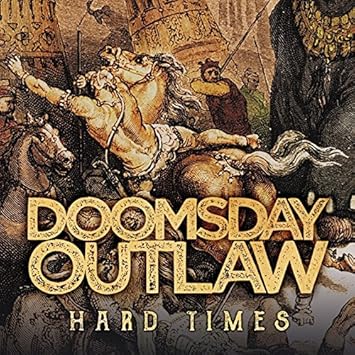The history of rock and metal begin with the blues. Whether it's Zeppelin or Sabbath, Purple or the Stones, the origins are rooted in the old blues. That makes it a bit weird for me to say this, but I don't really like the blues. Since I grew up so long after those roots had sprouted in so many different directions, I could get into the various strains of rock and metal without ever really hearing any blues in it. That leaves me in an odd position when a band like Doomsday Outlaw comes along, where I have a bit of trouble wrapping my head around the sound of a band that epitomizes what rock and roll once was. Still, I always go into these things with an open mind, hoping that the next one will open my mind to what I've been missing.
My biggest issue tends to be that the blues are not a melodic style of music, and melody is my main interest. Think about it; when you recall any Zeppelin song, how often do you think of Plant's melody instead of Page's riff? I think the answer will be 'not very often'. Doomsday Outlaw is appealing, because they tend to approach the music from both directions.
"Over And Over" has a swaggering blues riff anchoring the song, but the chorus delivers a hooky chorus that wouldn't be out of place on an AOR record. That's exactly what's missing in so much of this style of rock, and why it's refreshing to hear a band that's able to bring something more to the music than a simple 12-bar jam. We have a ready made comparison with their label-mates Inglorious. They are both bands with a modern blues-rock approach, but they tackle things differently enough that there is plenty of room between them. Inglorious has a virtuoso singer, and relies heavily on his voice to carry the weight of their songs. Doomsday Outlaw isn't far behind, but they write for the melody to be the star, rather than the singer. It can be a nuanced difference, but it tilts the playing field the longer you listen.
When the band hits the right balance, the results are striking. "Over And Over", "Bring It On Home", and "Days Since I Saw The Sun" are all tracks that have grit, heaviness, and liberal doses of big melody. They stand out against what rock and roll has become, reminding us that the emotion that really powers the best music isn't anger, its sorrow. There's beauty to be found in darkness, but not in rage. Doomsday Outlaw is able to use the shadows to highlight this truth.
The don't always find the target. "Into The Light" is a bit listless as a ballad, while "Will You Wait" stretches out to over seven minutes, but never sounds as vibrant or vital as their more focused numbers. It probably is fitting that a band based on the old basics are at their best when they stick to the basics. Those songs are all highly enjoyable, while the detours are harder to embrace as much.
With "Hard Times" being a fairly lengthy record, that means even if you don't come around on those outliers, there's still plenty of material here to make it an enjoyable listen. I imagine that for people who are more dedicated to the blues than I am, this album will have more appeal. For me, it doesn't quite convert me to the cause, but it does make a strong enough case that I'll keep digging. One of these days I'll find gold.


No comments:
Post a Comment